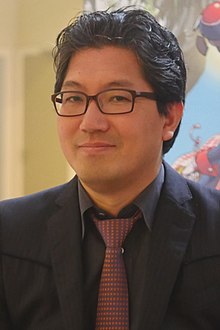Portal:Video games
The Video Games Portal

A video game, sometimes further qualified as a computer game, is an electronic game that involves interaction with a user interface or input device (such as a joystick, controller, keyboard, or motion sensing device) to generate visual feedback from a display device, most commonly shown in a video format on a television set, computer monitor, flat-panel display or touchscreen on handheld devices, or a virtual reality headset. Most modern video games are audiovisual, with audio complement delivered through speakers or headphones, and sometimes also with other types of sensory feedback (e.g., haptic technology that provides tactile sensations). Some video games also allow microphone and webcam inputs for in-game chatting and livestreaming.
Video games are typically categorized according to their hardware platform, which traditionally includes arcade video games, console games, and computer games (which includes LAN games, online games, and browser games). More recently, the video game industry has expanded onto mobile gaming through mobile devices (such as smartphones and tablet computers), virtual and augmented reality systems, and remote cloud gaming. Video games are also classified into a wide range of genres based on their style of gameplay and target audience. (Full article...)
Featured articles –
Jill is the protagonist of several Resident Evil games, novelizations and films and has appeared in other game franchises, including Marvel vs. Capcom, Project X Zone, Teppen, and Dead by Daylight. In later games, such as the 2002 Resident Evil remake, The Umbrella Chronicles (2007), Resident Evil 5 (2009), and The Mercenaries 3D (2011), her features were based on Canadian model and actress Julia Voth. Several actresses have portrayed Jill, including Sienna Guillory and Hannah John-Kamen in the live-action Resident Evil films.
Video game publications described Jill as among the most popular and iconic video game characters, and praised her as the most likable and consistent Resident Evil character. She has received acclaim and criticism with regard to gender representation in video games. Several publications praised the series for its portrayal of women, and considered Jill significantly less sexualized than other female game characters; she was also cited as an example of a female character who was as competent as her male counterparts. Others said that she was weakened as a protagonist by attributes which undermined her role as a heroine – specifically, an unrealistic body shape which did not reflect her military background. Some of Jill's overtly-sexualized costumes have also been criticized. (Full article...)
System Shock's 3D engine, physics simulation and complex gameplay have been cited as both innovative and influential. The developers sought to build on the emergent gameplay and immersive environments of their previous games, Ultima Underworld: The Stygian Abyss and Ultima Underworld II: Labyrinth of Worlds, by streamlining their mechanics into a more "integrated whole"; it is considered one of the defining examples of an immersive sim.
Critics praised System Shock and hailed it as a major breakthrough in its genre. It was later placed on multiple hall of fame lists. The game was a moderate commercial success, with sales exceeding 170,000 copies, but Looking Glass ultimately lost money on the project. A sequel, System Shock 2, was released by Looking Glass Studios and offshoot developer Irrational Games in 1999. The 2000 game Deus Ex (produced and directed by Spector), the 2007 game BioShock, and the 2017 game Prey are spiritual successors to the two games. A remake by Nightdive Studios was released on 30 May 2023. (Full article...)
In the story, protagonist Neku Sakuraba and his allies are forced to participate in a game that will determine their fate. The battle system uses many of the unique features of the Nintendo DS, including combat that takes place on both screens, and attacks performed by certain motions on the touchscreen or by shouting into the microphone. Elements of Japanese youth culture, such as fashion, food, and cell phones, are key aspects of the missions and character progression.
The World Ends with You received critical acclaim upon release, with critics praising the graphics, soundtrack, and integration of gameplay into the Shibuya setting. The few common complaints were related to the steep learning curve of the battle system as well as the sometimes imprecise touch-screen controls. In the first week of its release, the game was the second best-selling DS title in Japan, and the top-selling DS title in North America. Shiro Amano, writer and artist of the Kingdom Hearts manga, later created a manga based on the video game. An anime adaptation by Square Enix, DOMERICA, and Shin-Ei Animation aired from April 10 to June 26, 2021. (Full article...)
According to Chen, the company focuses on creating video games that provoke emotional responses from players. He has stated that, while the company is not opposed to making action-oriented games, he believes that enough such titles are released by the established video game industry. When designing a game, Chen and Thatgamecompany's process is to start by mapping out what the game should make the player feel, rather than by establishing game mechanics. Chen has stated that the company does not plan to produce large, blockbuster titles, due to their belief that the pressure for high sales would stifle innovation. (Full article...)
Customer surveys from Stainless Steel's previous game, Empire Earth, were used as a starting point for Empires: these inspired the team to take a more minimalist design approach, and to include civilizations without overlapping styles of play. Development was led by designer Rick Goodman who felt that historical realism often constrained gameplay rather than be a source of inspiration.
Empires was positively received by critics, who enjoyed its multiplayer component. However, certain reviewers disliked its single-player mode, and opinion clashed on the game's level of uniqueness compared to competitors such as Rise of Nations. The sales of Empires, when combined with those of Empire Earth, totaled 2.5 million units by 2004. (Full article...)
The game was built over the course of two years by a team of seven people split between San Jose and New York City. They debuted the game at the September 2010 Penny Arcade Expo, and it went on to be nominated for awards at the 2011 Independent Games Festival and win awards at the Electronic Entertainment Expo prior to release. Bastion was published in July 2011 for Xbox 360 via Xbox Live Arcade, and in August 2011 through digital distribution for Microsoft Windows on Steam. Supergiant Games made it available as a browser game for Google Chrome in December 2011. It was released for Mac OS X and iOS in 2012, for PlayStation 4 and PlayStation Vita in 2015, for Xbox One in 2016, and Nintendo Switch in 2018. Bastion's soundtrack was produced and composed by Darren Korb, and a soundtrack album was made available for sale in August 2011.
During 2011, the game sold more than 500,000 copies, 200,000 of which were for the Xbox Live Arcade. It sold over three million copies across all platforms by January 2015. The game was widely praised by reviewers, primarily for its story, art direction, narration, and music. Opinions were mixed on the depth of the gameplay, though the variety of options in the combat system was praised. Bastion has won many nominations and awards since its release, including several for best downloadable game and best music, from review outlets such as IGN and Game Informer as well as from the Spike Video Game Awards, the Game Developers Conference, and the Academy of Interactive Arts & Sciences. (Full article...)
Bloodlines is presented from first-person and third-person perspectives. The player assigns their character to one of several vampire clans—each with unique powers— customizes their combat and dialog abilities, and progresses through Bloodlines using violent and nonviolent methods. The selection of clan affects how the player is perceived in the game world and which powers and abilities they possess; this opens up different avenues of exploration and methods of interacting with or manipulating other characters. The player can complete side missions away from the primary storyline by moving freely between the available hubs: Santa Monica, Hollywood, downtown Los Angeles, and Chinatown.
Troika's 32-member team began developing Bloodlines in November 2001 as an indirect sequel to the previous year's Vampire: The Masquerade – Redemption. Troika used Valve's Source game engine, then in development, which was used for Valve's own Half-Life 2. The game's production was turbulent, as the design's scope exceeded the available resources, and the team was left without a producer for nearly a year until Activision appointed David Mullich to the role, where he found designs and levels unfinished or abandoned. After three years in development with no end in sight and running over budget, Activision set a strict deadline for completion, and Bloodlines was released incomplete in November 2004. (Full article...)
In Journey, the player controls a robed figure in a vast desert, traveling towards a mountain in the distance. Other players on the same journey can be discovered, and two players can meet and assist each other, but they cannot communicate via speech or text and cannot see each other's names until after the game's credits. The only form of communication between the two is a musical chime, which transforms dull pieces of cloth found throughout the levels into vibrant red, affecting the game world and allowing the player to progress through the levels. The developers sought to evoke in the player a sense of smallness and wonder and to forge an emotional connection between them and the anonymous players they meet along the way. The music, composed by Austin Wintory, dynamically responds to the player's actions, building a single theme to represent the game's emotional arc throughout the story.
Reviewers of the game praised the visual and auditory art as well as the sense of companionship created by playing with a stranger, calling it a moving and emotional experience, and have since listed it as one of the greatest video games of all time. Journey won several "game of the year" awards and received several other awards and nominations, including a Best Score Soundtrack for Visual Media nomination for the 2013 Grammy Awards. A retail "Collector's Edition", including Journey, Thatgamecompany's two previous titles, and additional media, was released in August 2012. (Full article...)
Did you know... -
- ... that Rockstar Vienna was the largest video game developer in Austria when it closed in 2006?
- ... that the 1987 video game Oriental Hero was panned as "so incredibly bad it's almost worth a look"?
- ... that deceased YouTuber Technoblade beat the video game Minecraft in hardcore mode using a racing-wheel controller?
- ... that the 1979 video game Superman was one of the first console games with a pause feature?
- ... that the 2014 text adventure The Uncle Who Works for Nintendo is inspired by a source cited by children for spreading video game rumors?
- ... that the video game Serious Sam: Tormental was originally inspired by Geometry Wars?
- ... that the contrabass trombone has experienced a revival in film music and video game soundtracks?
- ... that after becoming paralyzed from the neck down, Rocky "RockyNoHands" Stoutenburgh broke two Guinness World Records in the video game Fortnite?
- ... that Justin Yu, the current Classic Tetris World Champion, is also a cellist in MIT's video game orchestra?
- ... that the game designer of the video game Hades said that the characters were attractive "because Jen Zee"?
- ... that Goodboy Galaxy was the first commercially released video game for the Game Boy Advance in more than 13 years?
- ... that the video game Manor Lords was wishlisted more than three million times on Steam after its developer had estimated it would receive around 14,000?
Selected biography –
Selected image -

Recent video game-related events
- January 16, 2025 –
- Nintendo officially reveals the Nintendo Switch 2 video game console, the successor to the Nintendo Switch. (Nintendo)
- September 12, 2024 – 2023–2024 video game industry layoffs
- Microsoft announces that it will lay off 650 Microsoft Gaming employees as part of cuts to its workforce. (Variety)
- August 15, 2024 –
- American video game magazine Game Informer discontinues publication after 33 years. The magazine's website is also shut down. (BBC News)
Topics
Categories
Things you can do
In other Wikimedia projects
The following Wikimedia Foundation sister projects provide more on this subject:
-
Commons
Free media repository -
Wikibooks
Free textbooks and manuals -
Wikidata
Free knowledge base -
Wikinews
Free-content news -
Wikiquote
Collection of quotations -
Wikisource
Free-content library -
Wikiversity
Free learning tools -
Wiktionary
Dictionary and thesaurus















































